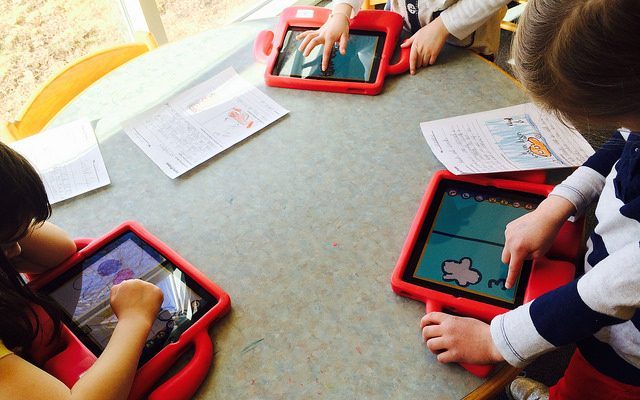5 Keys to Family Engagement
With families being essential to students’ academic success, here are a handful of ideas to turn education into a collaboration.
By Candra Morris
Children learn a lot of important information and skills at school, but it’s their families who are their first and most important teachers. Their families support them as they work to succeed academically, and their families teach them to persevere in the face of challenges. Sometimes their caregivers can help teachers understand what students are going through: When I was a classroom teacher, I had a student who never talked in class. Through her family, I eventually learned that her sister had been diagnosed with multiple sclerosis, which was certainly affecting her ability to be fully present in school.
It’s families who teach children that education is important, who extend the learning day after class, who make sure they’re at school ready to learn every morning, and who help them keep going when things get hard. But for many educators, trying to get students’ families engaged with school can feel like a challenging task.
As I write in my book, Why Every Child Needs a Village for Academic Success, “It’s not that parents or caregivers don’t want to provide for their children. Life gets hard, it’s up to us as educators and the community to join together to create an environment where it’s safe for children to say, ‘Last night wasn’t a good night. I need extra support today.’ This is where it’s important to build safe, trusting, and affirming school communities.”
In my years working with students and families in and out of the classroom, I’ve found that successful family engagement efforts begin by centering families and their needs, much as teachers center children in their classrooms. Here are five keys to making that happen.
It’s never too early to start.
It’s important to start engaging families early in a student’s academic career and near the beginning of each school year. Engaging families of young children allows caregivers to develop a habit of viewing their child’s educator as a teammate. Families who are plugged in through early learning experiences may not experience learning gaps later due to the benefits of interventions and supports early on.
To build a culture of engagement with families at the beginning of the school year, take advantage of opportunities like back-to-school night, family night, or meet-your-teacher night. These are great opportunities to meet families and let them know right off the bat that they can speak on behalf of their child—and that you’re eager to listen. It’s also a great opportunity to see what your students’ families actually look like, regardless of whatever preconceived notions you may carry about what makes a family. It is my hope that children who see that their families take school seriously will take it seriously themselves and value education.
Now is the time to reinvent back-to-school night by embracing families as key stakeholders from the beginning. To do this, spend some time getting to know the families. Give them a chance to share their educational experiences and what they expect from their child and teacher. Ask questions about what they hope their child will learn. Part of starting early is ensuring that when families visit the classroom, they feel welcomed, and see themselves reflected there.
Create an environment that welcomes families.
Teachers already spend a lot of time thinking about how to make their classrooms welcoming to students, but it’s important to extend that welcome to their families, as well. When family members walk through the halls, do they feel they belong there? Do they see their identities in the curriculum resources and work on display?
Having family projects that you can display on the walls not only makes families feel more comfortable in your school, it gives your students an opportunity to feel pride in their caretakers and the work they do together. Ask them to create a family collage with someone at home to display in the classroom, or if you have a monthly theme for your class, send home a family project related to that theme each month, for example.
If you’re able to engage families enough that they volunteer to help out at school, in addition to sending them a thank-you note, hang up pictures of their service to both welcome other families and show off how fun family engagement can be.
Listen to families.
The No. 1 partner schools have in educating our students is families, so it’s essential to be considerate of things families may be experiencing outside of school. Maybe unemployment is impacting the household. Does someone in the family have COVID? There are any number of challenges they could be dealing with, and discovering them requires treating families as partners and elevating their voices.
Doing this can be as informal as listening to them on an impromptu phone call or as official as sending a survey designed to find out what families need to become a bigger part of their school community.
Whatever the method, the key is your willingness to change what you’re doing and experiment with new ways to meet families where they are. A survey will only be meaningful if it is used to drive change.
Inspire participation any way you can.
Surveys, by the way, are also one of my favorite solutions to what perhaps is the biggest bugaboo of family engagement: participation. You can plan the biggest, most exciting event ever, but if no one shows up, it doesn’t matter. Surveys are a great opportunity to show your students’ families that you are listening to them. They will give you the information you need to build engagement opportunities specific to your students’ families needs—just ask them!
As an educator, you have to keep communicating about engagement opportunities through any channel you can find. Send texts. Send paper invitations through regular mail. Email families. Use ClassDojo. Send home stickers. At one of my schools, we even used wristbands to send home important information to families. And, of course, if you can get your students eager and excited about a family engagement activity, they’ll do plenty of communicating with their caregivers for you, as well.
Before you begin flooding those communications channels, though, be sure you’ve given families plenty of choices in how they participate. Whenever possible, give them multiple times from which to choose, for example. If your event takes place onsite, look for ways families can attend virtually. Make it as easy for them as possible.
Start a family engagement team.
In the end, family engagement is about community building, and none of us can build community alone. If your school or district doesn’t have a family engagement team, start one! Find teachers who’ve already had some success or are eager to get started, set a couple of achievable goals to work toward, and start engaging families.
Candra Morris is a director of family partnerships at Waterford.org. She holds a bachelor’s degree in early childhood education and a master’s degree from Johns Hopkins University in education supervision and administration. In her seventh year as a classroom teacher, she was selected as a Promoting Equity in Early Childhood Education (PEECE) Fellow as part of a cohort focused on special education for culturally linguistically diverse learners at George Washington University. She can be reached at [email protected] or on LinkedIn.





